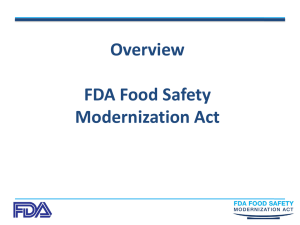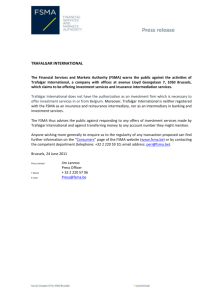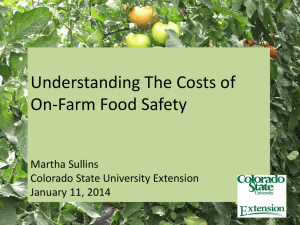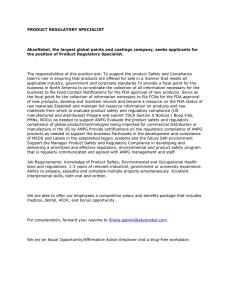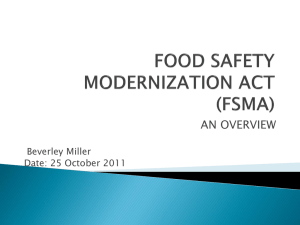FSMA ready? Is your business
advertisement
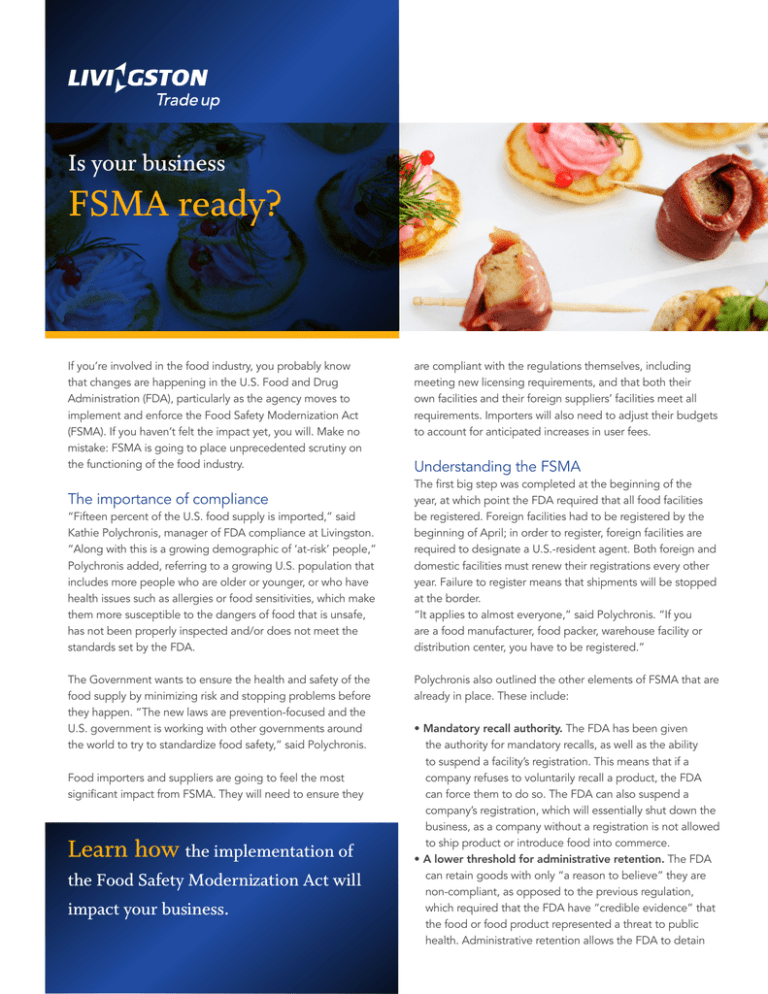
Is your business FSMA ready? If you’re involved in the food industry, you probably know that changes are happening in the U.S. Food and Drug Administration (FDA), particularly as the agency moves to implement and enforce the Food Safety Modernization Act (FSMA). If you haven’t felt the impact yet, you will. Make no mistake: FSMA is going to place unprecedented scrutiny on the functioning of the food industry. The importance of compliance “Fifteen percent of the U.S. food supply is imported,” said Kathie Polychronis, manager of FDA compliance at Livingston. “Along with this is a growing demographic of ‘at-risk’ people,” Polychronis added, referring to a growing U.S. population that includes more people who are older or younger, or who have health issues such as allergies or food sensitivities, which make them more susceptible to the dangers of food that is unsafe, has not been properly inspected and/or does not meet the standards set by the FDA. The Government wants to ensure the health and safety of the food supply by minimizing risk and stopping problems before they happen. “The new laws are prevention-focused and the U.S. government is working with other governments around the world to try to standardize food safety,” said Polychronis. Food importers and suppliers are going to feel the most significant impact from FSMA. They will need to ensure they Learn how the implementation of the Food Safety Modernization Act will impact your business. are compliant with the regulations themselves, including meeting new licensing requirements, and that both their own facilities and their foreign suppliers’ facilities meet all requirements. Importers will also need to adjust their budgets to account for anticipated increases in user fees. Understanding the FSMA The first big step was completed at the beginning of the year, at which point the FDA required that all food facilities be registered. Foreign facilities had to be registered by the beginning of April; in order to register, foreign facilities are required to designate a U.S.-resident agent. Both foreign and domestic facilities must renew their registrations every other year. Failure to register means that shipments will be stopped at the border. “It applies to almost everyone,” said Polychronis. “If you are a food manufacturer, food packer, warehouse facility or distribution center, you have to be registered.” Polychronis also outlined the other elements of FSMA that are already in place. These include: •Mandatory recall authority. The FDA has been given the authority for mandatory recalls, as well as the ability to suspend a facility’s registration. This means that if a company refuses to voluntarily recall a product, the FDA can force them to do so. The FDA can also suspend a company’s registration, which will essentially shut down the business, as a company without a registration is not allowed to ship product or introduce food into commerce. •A lower threshold for administrative retention. The FDA can retain goods with only “a reason to believe” they are non-compliant, as opposed to the previous regulation, which required that the FDA have “credible evidence” that the food or food product represented a threat to public health. Administrative retention allows the FDA to detain Get ready for FSMA: food shipments for a limited period of time, during which the agency undertakes legal action to formally seize the product. •Increased enforcement and scrutiny of food imports. The FSMA ultimately aims to secure the food chain, including the production and importation of food from foreign facilities. As a result, in addition to increased inspection of foreign food facilities, “FDA has stepped up enforcement and is working closely with U.S. Customs and Border Protection (CBP) to identify smuggled or misrepresented food and food products,” explained Polychronis. •New fees. New user fees are being imposed under law. These include fees for the inspection of foreign facilities and fees to re-inspect both domestic and foreign facilities after violations are identified and corrections made. ”The re-inspection fees can be significant,” added Polychronis. • Ensure your registration is up-to-date. • Assess your safety plans • Establish and document preventive measures • Create a recall plan • Plan for increased surveillance and sampling at the border Be proactive The next big hurdle will be foreign supplier verification. While not implemented yet, Polychronis said that this initiative will require that food importers in the U.S. conduct supplier verification exercises, or be held liable for issues and fees arising from non-verified suppliers. Polychronis also says that food importers can expect to see changes to the requirements for import certificates for food deemed high risk. Finally, Polychronis said that a fee-based voluntary qualified importer program will be put in place. This will allow low risk food importers with a solid compliance reputation to pay a fee that will allow them to move to the head of the FDA review line. Polychronis is advising clients to prepare themselves now for the new regulations – both those that are already in place and those yet to be implemented. She suggests that those companies involved in the food industry take the following actions: 1.Ensure your registration is up-to-date. 2.Assess your safety plans: you must have a written safety plan in place that assesses hazards in your facility. 3.Establish and document preventive measures: under FSMA, everything must be documented and traceable. 4.Create a recall plan and outline how each product is manufactured and/or managed. Again, document everything; good record keeping is a critical element of FSMA. 5.Plan for increased surveillance and sampling at the border. There are also some fairly straightforward, common sense things companies can do to make sure they are compliant and that you don’t have any nasty surprises. “For instance, if you are using a supplier, make sure they are not on the U.S. FDA Buyer Alert,” recommends Polychronis. And if you are bringing shipments across the border, don’t cross at 2:00 a.m. “Cross when the border is open and well-staffed,” added Polychronis. “Be proactive; monitor your shipments better and track the guidelines as they’re published,” said Polychronis. “Implementation doesn’t happen overnight; it’s a phased-in process, so businesses have time to get ready.” Contact your Livingston account executive e-mail us at solutions@livingstonintl.com or give us a call at 1-800-837-1063 Visit www.livingstonintl.com 2 Is your business FSMA ready?


